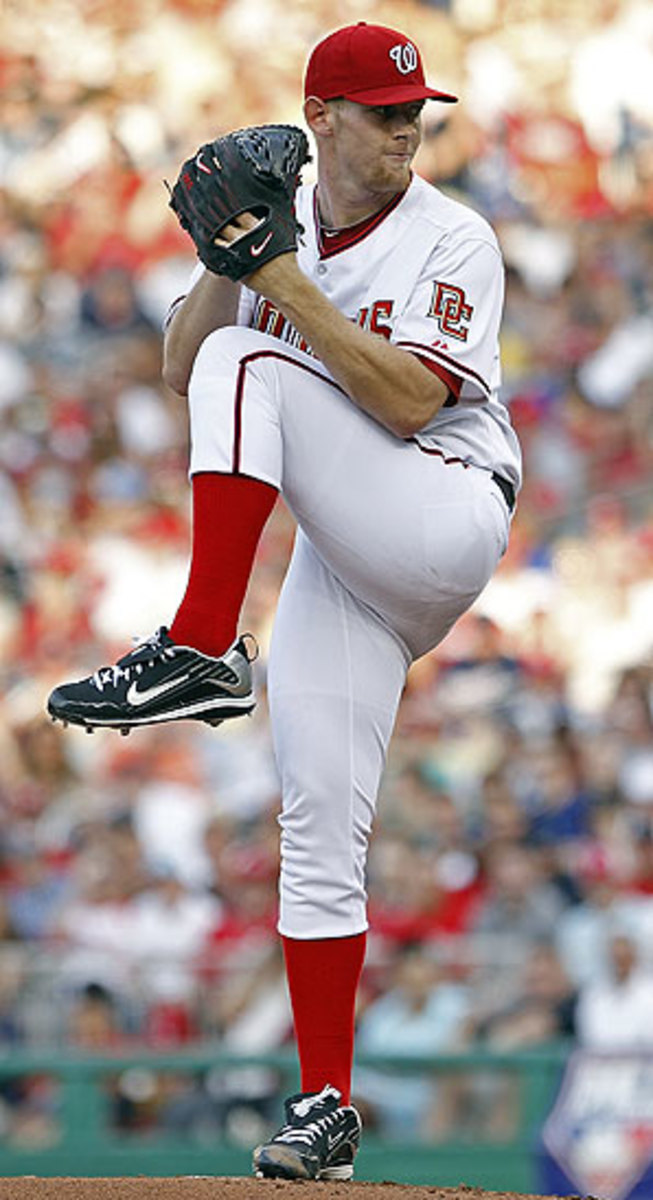Biggest challenge for Strasburg, Nats? Managing expectations
That final stretch is what we'll remember. Strasburg, going almost exclusively fastball/curveball after Delwyn Young homered off his changeup, put together a dominant three-inning stretch that called to mind Kerry Wood's 20-strikeout game in 1998, in what was the fifth start of Wood's career. Strasburg is similar to Wood in build and in repertoire, with that big fastball and the hard curve that leaves a hitter sitting on the heat with very little opportunity to adjust.
The Young homer was the turning point in the game for Strasburg, who was a completely different pitcher afterward. Having started six of the first 15 hitters with balls and gone to 2-0 three times and 3-0 once, throwing just 34 of 56 pitches for strikes, he simply blasted the strike zone from that point on: Seven of nine hitters got first-pitch strikes, 31 of 38 pitches total were strikes. In those last three innings the Pirates made contact on just seven offerings, fouling off six. It was as if after the Young homer Strasburg took a look around and remembered that he was facing the Pittsburgh Pirates and decided to treat them accordingly.
There was so much to like on this night that it seems like nitpicking to put the performance into context, but as with everything on a baseball field, the context is everything. The first thing you have to consider is the opposition. With Ryan Doumit getting the night off, Strasburg was facing a lineup that featured four players with sub-.300 OBPs, plus the pitcher's spot, and exactly one player who has proven himself to be a good major league hitter, Andrew McCutchen. It is not immediately apparent that the lineup Strasburg dominated on Tuesday night, which included a guy with a .270 OBP in the No. 5 spot (Young), is any better than the lineups he was facing as a Syracuse Chief. We already knew that Strasburg had the ability to shut down Triple-A teams, and despite the uniforms and the salaries, the Pirates of June 8, 2010, had more in common with a Triple-A team than a major league one. Strasburg fell behind a lot in the early innings, and the Pirates simply don't have the personnel to make him pay for that. Other teams do.
If there was one other concern it was one we heard a lot about during Strasburg's ascension through the minors. The pretense the Nationals used for keeping him down was concern over his work with men on base, with pitching from the stretch. He didn't have to do much of that on Tuesday night, but when he did, he was mostly ineffective. He allowed two hits to four batters pitching out of the stretch, including Young's home run. He used more than four pitches per batter (five, four, six, two) and got just three swinging strikes out of the stretch. His velocity didn't change, and it's such a small sample size that you have to take it with a grain of salt, but since the performance matched up with the Nationals' stated concerns, it's worth mentioning. Again, better teams are going to make Strasburg work harder, going to put more runners on base and force him into the stretch position more often.
Perhaps the greatest challenge Strasburg and the Nationals face is expectations management. For one, Strasburg is going to make maybe 15 starts in the majors this season as part of the team's long-term plan for simultaneously developing and protecting his arm. For another, pitching in the major leagues is hard, and even great talent doesn't always produce great results instantly. Tim Lincecum, the best pitcher in baseball, had a 4.00 ERA three years ago in his rookie season coming out of a stronger amateur environment. Wood, a first-season success story, had a 3.40 ERA and walked a man every other inning. Jered Weaver, whose rookie season of 19 starts with a 2.56 ERA would seem to represent the upper bound for Strasburg, had 26 minor league starts, more than double Strasburg's experience. It is difficult to pitch successfully in the major leagues from the jump. Strasburg can put up pedestrian statistics in his shortened rookie season and still call his year a success. The issue is whether the chattering classes will do the same.
Credit the Nationals for the timing of Strasburg's promotion, which ensures that his first month in the majors will serve as a very gradual introduction to major league hitters. His next start will be on Sunday against the injury-riddled Indians, 12th in the AL in runs and down two of their best players in Grady Sizemore and Asdrubal Cabrera. Assuming the Nationals start Strasburg every fifth game, he would then catch the White Sox (11th in the AL in runs) on June 19 and the Orioles (last in the AL in runs) on June 25 before finally seeing the Braves (second in the NL in runs) on June 30.
So while it doesn't seem possible, the hype around Strasburg could actually grow in the next couple weeks as he faces lineups nearly as weak as the one he dominated on Tuesday night.
This game was all about Strasburg's raw talent, which we've been hearing about for years. He showed off good mechanics, a great fastball, a sick breaking ball and a decent changeup. Most impressively, he adjusted to the game situation on the fly, sticking to his two best pitches once it became apparent that those were all he would need and become more aggressive in the strike zone against a team ill-equipped for that kind of challenge. The Nationals made their way down from Montreal in 2005, but it was only on Tuesday night, it seems, that they arrived.
ALSO SEE:INSIDE EDGE: How did Strasburg grade out in his first start?JOE POSNANSKI: Strasburg's huge night, inning by inningsJOE LEMIRE: Strasburg exceeds the hype in debut





